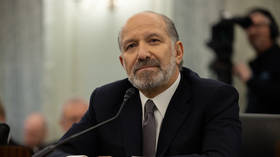Gazprom to cut off European state’s gas on January 1

Russian energy giant Gazprom announced on Saturday it will halt natural gas supplies to Moldova from January 1, citing the country’s refusal to pay debts. Moldova, a former Soviet state that relies heavily on Russian gas, has racked up an estimated $709 million in debts and overdue payments, according to Gazprom. Chisinau claims that it doesn’t owe this much.
Gazprom said it will reduce deliveries to zero starting at 8am Moscow time on January 1, based on contract terms and on Russian law. The company maintains that it reserves all rights, including unilaterally terminating the contract and seeking damages from Moldovagaz, of which Gazprom owns a 50% stake.
In response, Moldovagaz’s interim CEO, Vadim Ceban, assured citizens that contracted gas volumes from European and regional markets would meet the consumption needs of the right-bank of the Dniester River, which is territory controlled by Chisinau, through March 2025.
Moldova claims that from December 2022 it has sent the entire volume of gas it receives from Russia to a hydropower plant on the left bank of the Dniester in Transnistria, its breakaway self-governing region, receiving cheap electricity in exchange.
Moldova receives Russian pipeline gas via Ukraine’s transit network under a five-year contract with Gazprom, which is set to expire on December 31. Ukraine has repeatedly declared that the deal will not be extended and the flow will drop to zero on January 1, despite concerns from European states that continue to depend on Russian energy supplies.
Moldovan Deputy Prime Minister Oleg Serebrian warned earlier this month that Ukraine is unlikely to agree to continue transit “just for the sake of… Moldova,” and the country’s parliament declared a 60-day national state of emergency starting on December 16, which includes planned power outages, citing the prospect of “insufficient energy resources” and “uncertainties” with regard to energy supplies that stem from Kiev’s decision.
For decades, Moldova’s energy sector was almost entirely reliant on Russian gas delivered through Ukraine. After the Soviet Union dissolved, this dependency was formalized with the creation in 1999 of Moldovagaz, a joint venture between Russia’s Gazprom, the Moldovan government, and the breakaway region of Transnistria.
Despite early agreements offering relatively low prices, tensions began to surface as gas costs increased. By 2007, Moldova was paying $170 per 1,000 cubic meters, a sharp rise from the $80 it was paying in the early 2000s. Disputes over debts and pricing escalated, culminating in a controversial audit in 2022 that disputed much of the $709 million debt Gazprom asserted. However, the energy giant had calculated it without Transnistria’s debt.
The relationship soured further during a 2021 gas crisis when Moldova refused to accept Gazprom’s terms for a new contract. Chisinau claimed political motives for tearing up an energy deal with the EU over Russia’s demands, while Gazprom said it was simply unwilling to operate at a loss.
In 2021, Moldovan authorities reached an agreement with Gazprom to an audit of Chisinau’s historical gas debt. Consultants selected by Moldova without coordination with Gazprom questioned the validity of the $709 million debt, with Moldovan officials stating their willingness to pay only $9 million.
Moldova’s Prime Minister Dorin Recean described Gazprom’s move on Saturday as an oppressive tactic. He reiterated that Moldova rejects the debt, stating the government will not recognize the figure and plans to pursue international arbitration to protect the country’s interests.















